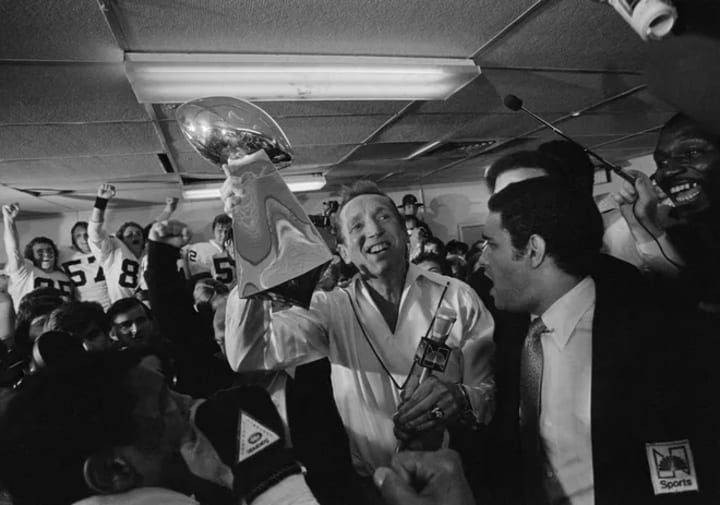History of the NFL Playoffs (Part IV: The Wild Card Playoff - 1978-1989)
A look at the introduction of the current opening round of the NFL Playoffs

The 1970s saw professional football change forever with the historic merger between the American Football League and the National Football League. The merger came with a new playoff format that qualified the three division winners (East, Central, and West) from each of the two newly formed conferences (American and National Football Conference), as well as a fourth playoff team known as the Wild Card. From 1970 until 1977, the NFL playoffs had three rounds: the Divisional Playoff, the Conference Championships, and of course, the Super Bowl, but in 1978, the NFL decided to deliver a new wrinkle into the playoff format.
Beginning with the 1978 season (the NFL's first 16-game season), a fifth playoff team was added in each conference, turning the tournament into a 10-team affair. With two Wild Cards per conference, it was also decided that the two Wild Cards would face each other for the right to advance to the Divisional Playoff, with the games marking the official debut of the Wild Card Playoff. Just like the NFL's past formats, Major League Baseball would instill this format in 2011 and would utilize it until the 2022 season. However, while MLB did eliminate the caveat that divisional foes could not face each other in the Division Series, the NFL still kept divisional foes from facing each other in the Divisional Playoff.
In 1978, the division winners were as follows. In the AFC, it was the New England Patriots (East), the Pittsburgh Steelers (Central), and the Denver Broncos (West). In the NFC, it was the Dallas Cowboys (East), the Minnesota Vikings (Central), and the Los Angeles Rams. Regarding the Wild Cards, the AFC Wild Cards that year were the Miami Dolphins and the Houston Oilers, while the NFC Wild Cards were the Atlanta Falcons and the Philadelphia Eagles.
The Wild Card Playoff was always played at the home stadium of the #4 seed in the conference, and the very first Wild Card Playoff game was the AFC battle between the Dolphins and Oilers, with the Oilers winning, 17-9, at Miami's Orange Bowl. In the NFC game, the Atlanta Falcons defeated the Philadelphia Eagles, 14-13. Normally, the Wild Card Playoff winner would face the #1 seed in the conference, but because the Steelers and Falcons held the top seeds, the Oilers and Falcons had to face the #2 teams in their respective conferences. The Falcons fell to the Dallas Cowboys in the NFC Divisional Playoff, but the Oilers actually defeated the Patriots in the AFC Divisional Playoff, only to be blasted by the Steelers in the AFC Championship.
The Oilers would host the 1979 AFC Wild Card Playoff, a 13-7 win over the Broncos, and would return to the AFC Championship after defeating the top seed San Diego Chargers, only to be defeated by the Steelers again. The Eagles won the NFC Wild Card Playoff this time over the Chicago Bears, but the Divisional Playoff would be their dead end again.

Though 1980 marked the third year of the Wild Card Playoff, it actually marked 11 seasons of the Wild Card spot's existence. In the first ten seasons, no Wild Card had won the Super Bowl, but that changed in the 1980 season. The Oakland Raiders went 11-5 during the 1980 season, which matched the Chargers' record, but the Bolts won the AFC West due to having more net points than Oakland. The Raiders made it as one of the AFC's two Wild Cards, and the Wild Card Playoff saw them defeat the Houston Oilers, 27-7, to advance. The squad would rack up road wins over the Cleveland Browns (AFC Divisional Playoff) and the Chargers (AFC Championship), and then win Super Bowl XV, 27-10, over the Philadelphia Eagles. With the addition of the Wild Card Playoff, a team could have to win three games just to get to the Super Bowl, with the big game being that fourth win. The 1980 Oakland Raiders became the first team to do just that.
Two Wild Cards qualifying per conference allowed the possibility of a third place team reaching the playoffs, and in 1981, it happened in both conferences. The AFC Wild Cards that year were the New York Jets and the Buffalo Bills, while the NFC Wild Cards were the New York Giants and the Philadelphia Eagles. The Bills and Giants (both #5 seeds) won their respective Wild Card games, but neither team moved past the Divisional Playoff.
In 1982, a nearly two month long strike forced the season to be cut almost in half, resulting in a nine-game season that saw the playoff format abandoned for that year in favor of a 16-team tournament that saw the top eight teams in each conference qualify. That year featured a Cinderella run, as the New York Jets became the first #6 seed to win a playoff game, and the first #6 seed to reach the Conference Championship, where they were blanked by the Miami Dolphins.
The format returned on the following year (1983), but two years later, we would see another improbable run.

We all know how the 1985 season ended for the New England Patriots. What's forgotten in this saga is that this was a Cinderella run for the Patriots, as they finished the regular season in a three way tie with the New York Jets and the Denver Broncos, with the Jets earning the #4 seed thanks to conference record, while the Pats received the last spot due to a deeper tiebreaker: common opponents. This didn't deter the Patriots. They would win the Wild Card Playoff over the Jets, and then they would oust the top-seed Raiders in the Divisional Playoff, and blast the Miami Dolphins, 31-14, in the AFC Championship to reach Super Bowl XX--their first Super Bowl appearance in franchise history. Again, we know how it ended for them, but once upon a time, the Patriots actually did things the hard way.
The last years of the 1980s would see two more #5 seeds make long runs. The Minnesota Vikings became road warriors on their way to the NFC Championship in 1987, and the Los Angeles Rams took that same route two years later in 1989. The following season would see the NFL in a new decade, which would include a slight addition to the playoff format.
If you like this story, click the heart and the subscribe button, and feel free to comment below! Tips and pledges would be greatly appreciated, but only if you want to do so!






Comments (3)
Wonderful review!!! ❤️❤️💕
You nailed this sports story perfectly!
Another informative sports history story 🙂Excellent work